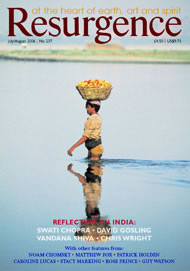GOOD, SHELTER, HEALTH, security and education, as well as the less definable need for affection, participation in a community, creative opportunity, freedoms, leisure and friendships, are all essential qualities of civilisation. But governments shy away from complexities.
In 1776 Adam Smith wrote of an individual, “by pursuing his own interest he frequently promotes that of society more effectively than when he really intends to promote it,” facetiously ascribing this to “an invisible hand”. He used this phrase only once, but it became an icon. The attempt to subject all aspects of governance and trade to economics, however alien to the regulated society in which Smith lived, is the “globalism” about which John Ralston Saul writes. It has been tried four times. Each ended in disaster.
The first attempt arose out of the Enlightenment and collapsed with the Napoleonic Wars. The second raised it to the level of religious dogma at the end of the 19th century: a law which prevents free trade, said Richard Cobden in the House of Commons in 1843, is a “law which interferes with the wisdom of the Divine Providence. We have a principle established now which is eternal in its truth and universal in its application, and must be applied to all nations and throughout all times, and not applied simply to commerce, but to every item of the tariffs of the world.” John Bright added: “Free trade principles have become, verily, a religious question.” This attempt collapsed with the First World War. The third collapsed with the Depression and the Second World War. The fourth attempt lasted from 1970 to 2000 and was introduced by Margaret Thatcher with the quasi-religious zeal of TINA: There Is No Alternative.
Politicians flocked to Davos to hear words of wisdom from corporate leaders and, as Saul puts it, “to reinforce their willing suspension of disbelief”.
Only true believers could be blind to the effects of the creed. The world is seething with an overwhelming sense of injustice. Half the world now lives on or below the poverty line. Since 1980, Africa’s GDP, which had previously been rising, has fallen 6.2%. Poor-country debt is out of hand. Many rural areas are experiencing an epidemic of suicides. The income gap in the UK is at its highest since the 1880s.
The high point was 1995 with the creation of the World Trade Organization (WTO). Labelling, source, genetics and insecticides might be of primary concern to citizens, but to the WTO they are protectionist interference; and food is no longer something we eat to stay alive, nor the subsistence of a community, but the subject of competition and trade.
The UK demonstrated the crass stupidity of abandoning strategic assets to the market: no alternative energy sources were developed while we extracted North Sea oil and gas at breakneck speed; we used them when prices were lowest and are now forced to import as prices spiral out of control. Being among the last true believers in globalism, Britain is now abandoning its other national assets and services.
Globalisation of finance was the greatest disaster. The speculative trade in currency has destroyed many national economies. Corporations move their money wherever tax is lowest: in the UK in 2004 twenty major non-oil companies with a turnover of £100,000 million paid taxes of just £350 million – 0.35% – so the Government, no longer able to afford public services, promotes casinos and the lottery to extract money from the poor.
The US, France and Britain converted arms production into commerce (UK the biggest per capita exporter, US the biggest total exporter), laying the groundwork for the violence and insecurity that have usurped centre stage from globalism. Are we now in a war that equates to those that followed the previous three attempts? The West detonates high-tech weaponry around the world, spawning irregular wars and sinking the Middle East into a vortex of violence. Saul comments: “to approach irregular warfare as if it were unethical is to deny yourself the ability to deal with it.”
So where are we now? Globalism, like the Soviet system, did not fail because of a rival ideology: it failed because it didn’t work. We are now in a vacuum.
We have passed through a period where elites have been obsessed with abstract theories. There is a growing desire to build our societies with our own hands; to find ways to get involved. Non-governmental organisations are having an increasing influence and could take a lot more responsibility. People may want an international side to their lives but they also want to live in communities. Islamic society is based on community. The new members of Europe are not looking to meld into a larger Europe but to establish their national identity. Saul seems optimistic that there is a civic and positive side to the new nationalisms. He also gives a perceptive analysis of the rise of China and India.
Saul is a Canadian novelist with a pervasive concern for the individual against the elite, so, not surprisingly, the book is eminently readable and has a wider vision of social life than have the true believers in globalism about whom he writes. It is a seminal book for understanding our times, and for understanding how we might get out of this nightmare and become, once again, a conscious civilisation.
James Bruges is the author of The Little Earth Book. He is working with Feasta on sustainable economics and is a member of the Quaker Economics Issues Group.






